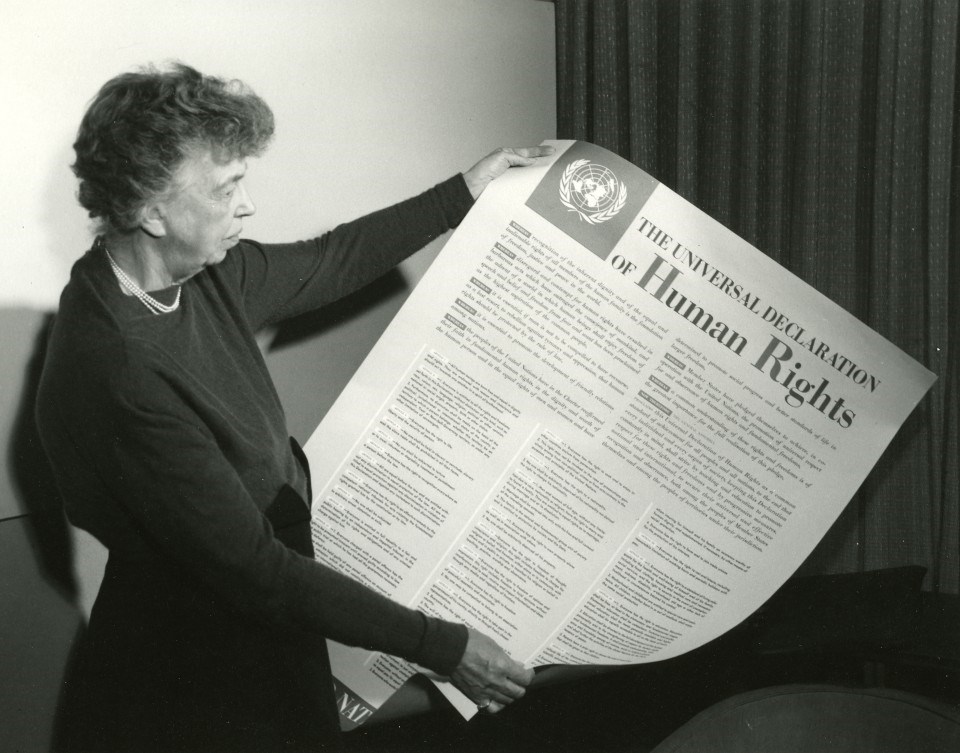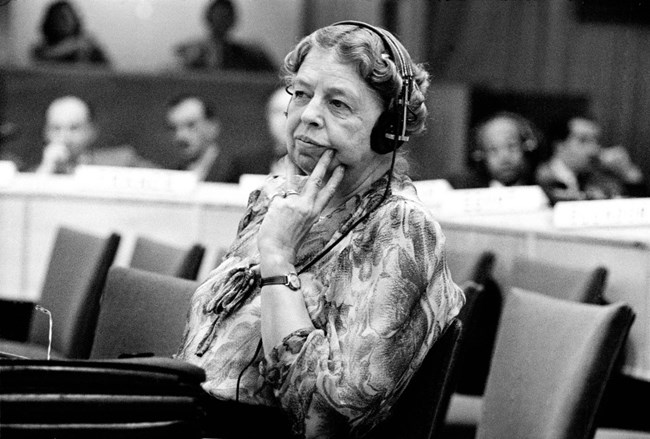How Did Eleno Roosevelt Help Franklin Get Elected Again Eleanor Roosevelt Helping Her Husband

FDR Library Photo
April 25, 1945, representatives from fifty nations convened in San Francisco to organize the United Nations. Over the course of ix weeks, the delegates debated what the scope and the structure of this new torso should exist. June 26, they adopted the Un Charter, Article 68 of which mandated that the General Assembly "set up commissions in economic and social fields and for the promotion of homo rights." In February 1946, post-obit the opening session of the General Associates, the United nations Economic and Social Council (ECOSOC) established a 9-member "nuclear" commission on human rights to recommend a structure and mission for the permanent Human Rights Commission (HRC). Dissimilar other commissions, even so, the delegates appointed to this nuclear body would be chosen for their individual claim rather than their national amalgamation.
President Harry Truman had appointed Eleanor Roosevelt to the United States delegation to the Un in Dec 1945. Before long after her return the post-obit February from London, where the General Assembly start convened, she received a telephone call from UN Secretary-General Trygve Prevarication, telling her that he had appointed her to the nuclear committee charged with creating the formal human rights commission.
April 29, 1946, at New York'southward Hunter College, Henri Laugier, the assistant secretary-general for social affairs, called the first session of the nuclear committee to guild. Laugier hoped the delegates would remember that "the gratuitous peoples" and "all of the people liberated from slavery, put in you their confidence and their promise, so that everywhere the authority of these rights, respect of which is the essential condition of the dignity of the person, be respected." Their work "would showtime [the Un] on the route which the Charter set for it." He concluded:
You will have earlier you the hard but essential trouble to define the violation of homo rights within a nation, which would constitute a menace to the security and peace of the earth and the existence of which is sufficient to put in move the machinery of the Un for peace and security. You volition have to suggest the establishment of mechanism of observation which volition discover and denounce the violations of the rights of man all over the world. Permit u.s. remember that if this machinery had existed a few years ago . . . the human community would have been able to stop those who started the war at the moment when they were nonetheless weak and the globe ending would have been avoided.
As shortly equally Laugier finished his remarks, Dr. C. L. Hsia, from China, nominated ER to chair the commission. All the delegates promptly endorsed his recommendation. ER, who did not anticipate this responsibleness, promised to "do my all-time, although my cognition of parliamentary police force is somewhat express." She recognized "that we are all witting of the great responsibility which rests upon us . . . . to help the United Nations achieve its primary objective of keeping the peace of the earth by helping human beings to live together happily and contentedly."1 One time the "nuclear" commission agreed on the structure the permanent committee should adopt, it adjourned.
ECOSOC had presented the HRC with iii tasks: "a draft International Declaration, a draft covenant, and provisions for the implementation." This was not easy work. It challenged the Committee to craft a vision, develop legally binding protocols acceptable to all member states, and structure an International Court of Human Rights. Political discord surfaced immediately, both inside the Committee itself and within the American delegation.
When the permanent Human Rights Commission convened in the fall of 1946, it promptly elected ER as its chair. For the side by side ii years, ER dedicated most of her energy to commission duties. This required trigger-happy patience and determination.

United Nations Photograph
Cold war politics ofttimes threatened to derail first, the drafting process, so, the adoption itself. Every bit the HRC debated what the three human being rights protocols should incorporate—and when the HRC should instruct the Un to act to protect the human rights of a nation's citizens—hyperbole erupted. American conservatives charged any homo rights certificate crafted past the Un would bring socialism to America while delegates from the Soviet bloc argued that racial segregation proved that the western democracies gave only lip service to civil and political rights.
Concerns regarding national sovereignty, real or imagined, also threatened to destroy the HRC'due south work. ER responded to these fears by urging the HRC to reorder its plan of piece of work. Rather than focus on crafting a legally binding International Bill of Rights, the HRC should work on all three ECOSOC tasks simultaneously. The delegates agreed and created subcommittees for each task. They and then appointed ER to chair the subcommittee charged with drafting the Annunciation.
Throughout these often exhaustive debates, ER strove to remind the HRC, and ultimately the United nations itself, that the Declaration must serve as a counterforce to the fear and horror exposed by World War II. She insisted that the Proclamation be written in clear accessible language so that it might exist readily embraced by peoples of the earth. She exerted like pressure on the U.Due south. Country Section, arguing that for the annunciation to take any impact information technology must not be seen as an American or western dominated document. In the process, she played the key role in convincing the Country Department to expand its concept of human rights from a concept of merely political and civil rights to include economic, social, and cultural rights.
For ER, her work with the HRC provided the opportunity to address issues she championed as First Lady (poverty consolation, access to education, conflict resolution, and civil rights) as well as the issues she addressed as a consul to the Full general Assembly (refugee concerns, humanitarian relief, and the reconstruction of war-torn Europe).
She saw this as real political piece of work rather than a mere intellectual practise. "Many of us thought that lack of standards for human rights the globe over was one of the greatest causes of friction among the nations," she told readers of Foreign Affairs, "and that recognition of human rights might become 1 of the cornerstones on which peace could somewhen be based."
She viewed the crafting of the annunciation every bit "a very grave responsibility." The peoples of the globe, many of whose lives seemed to teeter between hope and fear, "look upon the states, regardless of the governments nosotros spring from, as their representatives, the representatives of the peoples of the world, and for that reason, I hope that every 1 of u.s.a. is going to feel, in the consideration of the question of how we constitute the full Commission and of how nosotros recommend that the piece of work shall be undertaken."two
Though non legally binding, ER idea the declaration could push the world away from war. If it could establish "basic standards" which would guide the United Nations in "promoting and encouraging respect for human rights and fundamental freedoms for all," it would have the "moral" force necessary to "guide and [inspire] individuals and groups throughout the world . . . to promote respect for human rights."
Responding to a wave of pressure from President Truman and Secretarial assistant of State George C. Marshall to launch a moral offensive against the USSR, she agreed to deliver a keynote address at the Sorbonne in Paris in September 1948. She titled her remarks, "The Struggle for Homo Rights."
Past the fourth dimension ER assumed the podium that fall, domestic politics and international tensions combined forces to hinder the Declaration's adoption. The subcommittee had distributed its typhoon of the Proclamation (which the Soviet bloc had not endorsed) for member nations' review in the jump. Over the summer, the Soviets blockaded Berlin, communist-supported unions struck in Italy and France, the Arab-Israeli conflict escalated, Mao tse Tung battled nationalist forces in Cathay, and American political parties splintered.Calling "the preservation of human freedom" "one of the greatest issues of our time," ER told the overflow audience the world still struggled to rebound from the violence and coercion of wartime totalitarian governments and that only the Declaration had the "moral force" to shift the discussion away from the "reaction, retreat, and retrogression" of the by." The earth must take the time "to think carefully and clearly on the subject field of human rights, because in the acceptance and observance of these rights lies the root, I believe, of our chance for peace in the time to come, and for the strengthening of the Un organization to the point where it tin maintain peace in the future."3
ER's accost at the Sorbonne ready the tone for the forthcoming deliberations on the drafting of the annunciation. The drafting process involved 80-v working sessions (many lasting until well past midnight) in which new delegates revisited each give-and-take of the Announcement'south xxx articles. Discussions over the right to education, to an adequate standard of living, and to sometime-age pensions ran tardily into 1948, making ER worry that the commission might non human action in time to accept the announcement canonical by the General Assembly. She discussed these deliberations and then frequently in "My Day" that her column became both a primer on homo rights and a sustained call for endorsement. Indeed, she became so outspoken in her advocacy that her column took on a bluntness she rarely displayed. Increasingly frustrated with Soviet delaying tactics, she made her grievances public, telling her readers, "One would admire Soviet persistence in sticking to their bespeak if it were non for the fact that so frequently the bespeak is not worth sticking to."4
ER drove the committee hard. Dec 9, ER confided to her aunt:
[T]he Arabs & Soviets may balk—the Arabs for religious reasons, the Soviets for political ones. We volition have trouble at domicile for information technology can't be a U.S. document & get by with 58 nations & at home that is difficult to understand. On the whole I think it is skillful as a announcement of rights to which all men may aspire & which nosotros should effort to achieve. Information technology has no legal value but should comport moral weight.5
The General Associates adopted the Declaration the following day.
Endnotes
1 HRC, Nuclear Commission, 1st Meeting, Summary Record, 29 April 1946, (E/HR/6/1 May 1946), one-3, Franklin D. Roosevelt Library.
2 Eleanor Roosevelt, "The Hope of Human Rights," by Eleanor Roosevelt, Strange Affairs, April, 1948, in Allida Black, Courage in a Dangerous World: The Political Writings of Eleanor Roosevelt (New York: Columbia University Printing, 1999), 156-168.
3 Eleanor Roosevelt, "The Struggle for Human Rights" Spoken language at the Sorbonne, Paris, September 28, 1948, in Allida Black, The Eleanor Roosevelt Papers: Vol. one: The Human being Rights Years, 1945-1948, 900-905.
iv Eleanor Roosevelt, My 24-hour interval, December four, 1948 in Allida Black, The Eleanor Roosevelt Papers: Vol. 1: The Human being Rights Years, 1945-1948, 962-963.
5 Eleanor Roosevelt to Maude Gray, December ix, 1948, Franklin D. Roosevelt Library.
Source: https://www.nps.gov/elro/learn/historyculture/udhr.htm
0 Response to "How Did Eleno Roosevelt Help Franklin Get Elected Again Eleanor Roosevelt Helping Her Husband"
Post a Comment